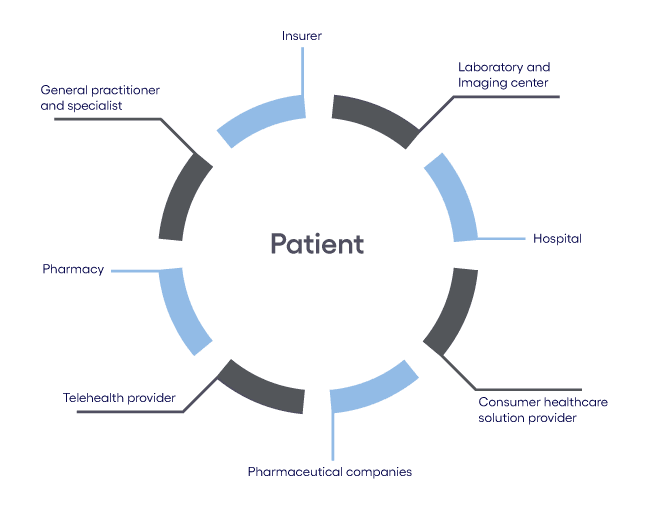Gain from a new perspective... grow with a new focus
Graphite is one of the leading consulting and operations firms in the country, consistently delivering innovative and practical solutions in healthcare. The healthcare industry provides an intricate set of requirements that entangle patient care, technology, legislative and fiscal challenges. Our multi-disciplinary approach provides what is needed when it is needed; allowing healthcare organizations see issues and plot a course to success. Our Graphite team will stand beside them the entire way ensuring a sustainable future.
Why is Data Integration Important in Healthcare?
Delivering Smarter, Faster Patient Care
Healthcare is centered around the patient, and data integration plays a pivotal role in ensuring better outcomes. When patient data from various sources—such as electronic health records (EHRs), diagnostic reports, and wearable devices—is consolidated, clinicians can gain a complete view of the patient’s health. This enables more accurate diagnoses, timely interventions, and personalized treatment plans that cater to individual needs. Additionally, it helps in identifying potential risks early and avoiding medication errors, ensuring safer and more effective care.
Streamlining Workflows
Fragmented data systems often lead to inefficiencies in healthcare delivery. Data integration eliminates these silos, enabling healthcare providers to work more collaboratively and efficiently. With integrated systems, healthcare professionals can access real-time information, reducing delays in decision-making. Administrative processes, such as scheduling, billing, and insurance claims, are automated, saving time and reducing errors. This streamlined approach allows providers to focus more on patient care rather than grappling with logistical challenges.
Reducing Costs and Eliminating Redundancies
Healthcare organizations face constant pressure to manage costs while maintaining quality care. Data integration helps achieve this balance by reducing inefficiencies and eliminating redundancies. When systems communicate effectively, the need for duplicate tests or procedures is minimized, saving both time and resources. Additionally, integrated data supports predictive maintenance of medical equipment and enables more accurate financial planning, helping organizations allocate their resources more effectively.
Accelerating Research and Innovation
Integrated healthcare data is a goldmine for researchers and innovators. By analyzing large, cohesive datasets, researchers can uncover valuable insights that drive medical advancements. This unified approach supports the identification of disease patterns, the prediction of outbreaks, and the development of innovative treatments and therapies. Whether it’s cancer research, genetic studies, or vaccine development, integrated data accelerates the pace of discovery and improves public health strategies.
Meeting Compliance and Regulatory Standards
The healthcare sector operates under stringent regulations to ensure patient privacy and data security. Integrated systems make it easier for organizations to comply with standards such as HIPAA and GDPR. By centralizing access to data, healthcare providers can better control who sees what information. This simplifies audit processes, ensures secure data sharing, and provides a clear record of compliance efforts, reducing the risk of costly penalties.
Empowering Patients with Access and Control
Data integration doesn’t just benefit providers; it also empowers patients by giving them greater control over their health information. Integrated systems enable patients to access their medical records through user-friendly portals and apps, providing a clear picture of their health status. This transparency encourages patients to take an active role in their care, leading to better adherence to treatment plans and improved overall satisfaction. It also fosters stronger communication between patients and providers, building trust and enhancing the care experience.
Why is Data Integration Important in Healthcare?
Delivering Smarter, Faster Patient Care
Healthcare is centered around the patient, and data integration plays a pivotal role in ensuring better outcomes. When patient data from various sources—such as electronic health records (EHRs), diagnostic reports, and wearable devices—is consolidated, clinicians can gain a complete view of the patient’s health. This enables more accurate diagnoses, timely interventions, and personalized treatment plans that cater to individual needs. Additionally, it helps in identifying potential risks early and avoiding medication errors, ensuring safer and more effective care.
Streamlining Workflows
Fragmented data systems often lead to inefficiencies in healthcare delivery. Data integration eliminates these silos, enabling healthcare providers to work more collaboratively and efficiently. With integrated systems, healthcare professionals can access real-time information, reducing delays in decision-making. Administrative processes, such as scheduling, billing, and insurance claims, are automated, saving time and reducing errors. This streamlined approach allows providers to focus more on patient care rather than grappling with logistical challenges.
Reducing Costs and Eliminating Redundancies
Healthcare organizations face constant pressure to manage costs while maintaining quality care. Data integration helps achieve this balance by reducing inefficiencies and eliminating redundancies. When systems communicate effectively, the need for duplicate tests or procedures is minimized, saving both time and resources. Additionally, integrated data supports predictive maintenance of medical equipment and enables more accurate financial planning, helping organizations allocate their resources more effectively.
Accelerating Research and Innovation
Integrated healthcare data is a goldmine for researchers and innovators. By analyzing large, cohesive datasets, researchers can uncover valuable insights that drive medical advancements. This unified approach supports the identification of disease patterns, the prediction of outbreaks, and the development of innovative treatments and therapies. Whether it’s cancer research, genetic studies, or vaccine development, integrated data accelerates the pace of discovery and improves public health strategies.
Meeting Compliance and Regulatory Standards
The healthcare sector operates under stringent regulations to ensure patient privacy and data security. Integrated systems make it easier for organizations to comply with standards such as HIPAA and GDPR. By centralizing access to data, healthcare providers can better control who sees what information. This simplifies audit processes, ensures secure data sharing, and provides a clear record of compliance efforts, reducing the risk of costly penalties.
Empowering Patients with Access and Control
Data integration doesn’t just benefit providers; it also empowers patients by giving them greater control over their health information. Integrated systems enable patients to access their medical records through user-friendly portals and apps, providing a clear picture of their health status. This transparency encourages patients to take an active role in their care, leading to better adherence to treatment plans and improved overall satisfaction. It also fosters stronger communication between patients and providers, building trust and enhancing the care experience.
Seamless Solutions for Every Healthcare Need
At Graphite, we specialize in working with medical practices and other related service and care providers, as well as healthcare organizations spanning large geographic areas to build clinically integrated networks.
You need ways to efficiently and securely handle raw data collection, warehousing and transformation, as well as the sharing of medical data between various systems. Our health IT offerings facilitate smoother physician and laboratory workflows, improved patient outcomes and increased revenues

Order Management
Our Order Management system simplifies the entire process of managing medical orders, from lab tests to prescriptions. With automated workflows, error-proof validation, and real-time tracking, healthcare providers can focus on patient care instead of administrative tasks. The system ensures compliance and reduces turnaround times, improving outcomes for patients and efficiency for staff.

Clinically Integrated Network
Build a connected ecosystem with our CIN solution, fostering seamless coordination between healthcare providers. By integrating data across facilities, practices, and specialists, CIN promotes holistic patient care, reduces redundancies, and ensures a unified care experience. Empower your network with actionable insights and streamlined communication.

Healthcare Application Ecosystem: A One-Stop Platform for Interoperability
Our Healthcare Application Ecosystem integrates third-party tools and applications into a unified interface. From scheduling and billing to telehealth and remote monitoring, the platform supports seamless interoperability, ensuring all your digital health needs are met in one place. It’s flexible, scalable, and designed to adapt as technology evolves.

Record Retrieval Tool: Fast, Secure, and Reliable Access to Data
Eliminate the hassle of locating patient records with our Record Retrieval Tool. This feature provides instant, secure access to patient histories, test results, and treatment plans. Equipped with advanced search filters and compliance-ready security measures, the tool ensures you have the right information at the right time for optimal decision-making.


